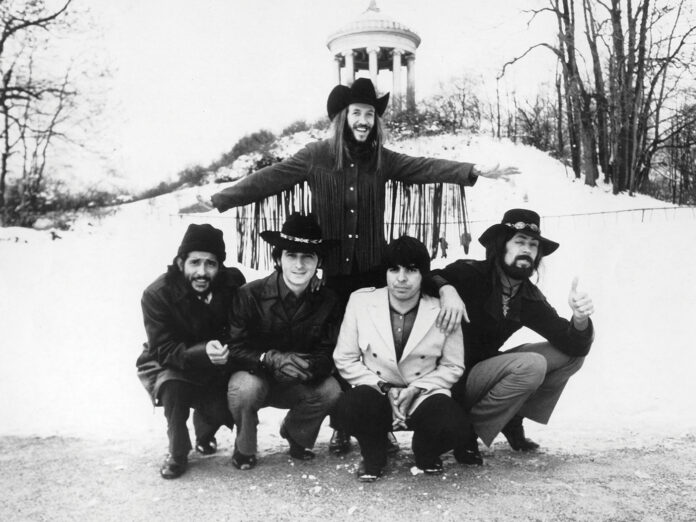When Jay Farrar was preparing Day Of The Doug, Son Volt’s 2023 tribute album to Doug Sahm, he turned to the Complete Mercury Recordings. The 5CD set covering Sahm’s work with the Sir Douglas Quintet from 1968-72 had a limited release in 2005, before sloping back into the vaults, along with Sahm’s reputation as an innovator and inspiration.
It’s not that Sahm is unknown. His work with the Tejano supergroup The Texas Tornados (along with SDQ’s organ player Augie Meyers, Flaco Jimenez and Freddy Fender) helped define and expand the canon of Texas music. Musicians know. Uncle Tupelo covered “Give Back The Key To My Heart”. The Coward Brothers sang “Be Real”. Margo Price duetted with Doug’s son Shawn Sahm – the keeper of the flame – on “I Wanna Be Your Mama Again”.
The spade-work for Sahm’s later success was done in these recordings with the Sir Douglas Quintet, where he and Meyers chopped their influences into a Texas stew, even when Sahm was pretending to be an English gent, or inhaling Haight-Ashbury from beneath a cosmic cowboy hat.
Sahm’s open-mindedness was rooted in childhood. Born in San Antonio in 1941, he was a musical prodigy, singing on the radio at the age of five. Invitations from the Grand Ole Opry were resisted by Sahm’s mother, who preferred to keep “Little Doug” in school, though he got close enough at one performance to detect whisky on the breath of the ailing Hank Williams. Across a field from his childhood home, Sahm could eavesdrop on club shows by the likes of Bobby “Blue” Bland, Hank Ballard and James Brown, though he mostly listened to country radio, and saw the swinging Bob Wills and his Texas Playboys when he was 10 years old.
Such diversity reflected the reality of San Antonio, where polka, jazz and pop added spice. But it wasn’t necessarily the way to get ahead in the mid-1960s. Sahm’s breakthrough came courtesy of the (later disgraced) producer Huey P Meaux who, aiming to capitalise on the British Invasion, encouraged the pretence that Sahm’s band was English, despite two of them being visibly Mexican, and – ironically – the musicians having a more intuitive grasp of American roots music. The moment of their unmasking, on a TV show hosted by Trini Lopez, followed a performance of their first hit “She’s About A Mover” in which the Beatle-haired Texans shook it up on a set littered with castles, hobby horses and a sullen model in a suit of armour. “She’s About A Mover” appears on this set in a re-recording from 1968, faithful to the fairground shuffle of the original, but with additional “freaky” guitar reflecting the musical journey Sahm made when a drugs bust forced him to flee Texas in favour of Northern California.
The first of the albums in this box, Sir Douglas Quintet + 2 = (Honkey Blues) is the least typical, as Meyers is missing from the lineup, having failed to follow Sahm’s western flight. It’s a significant loss, but the album is underrated. The opening “Are Inlaws Really Outlaws” is a swinging country number with a rasping vocal from Sahm and swinging soul horns. Sahm was more than an interested spectator in the West Coast hippie lifestyle, but he’s faithful to his musical inclinations. There is a hint of a wig-out at the start of “Can You Dig My Vibrations”, and the sense of things being out of proportion, and in uneasy time, infects “Whole Lotta Peace Of Mind” which meanders into jazz before collapsing in a heap.
Normal service is resumed on 1969’s Mendocino, the Quintet’s most approachable album, with Meyers back at the party. The brisk title track is as gorgeous as anything the Quintet did, and Sahm is at his self-mocking best on the self-explanatory “Lawd, I’m Just A Country Boy In This Great Big Freaky City”. There’s also a welcome airing for “Sunday Sunny Mill Valley Groove Day”, a bright outtake (as covered by Frank Black).
Sahm was not known for precision in the studio. Creatively, this meant the sound was often ragged. What you get, instead, is the sense of a groove. As a performer Sahm has the languid command of Alex Chilton, and a similar disdain for application, which may be why the most revelatory album is 1971’s The Return Of Doug Saldana, which roots Sahm firmly in the geography of his youth. There are many pleasures to be had on the album of singles (in mono) and in the Spanish language Mexican EP. But it’s hard to beat Sahm saluting Freddy Fender on “Wasted Days, Wasted Nights”, or playing pure country on the plangent “Keep Your Soul”. Best of all, until the moment it collapses into laughter, is “Stoned Faces Don’t Lie”, where Sahm sings sadly about how the San Francisco hippie dream has slipped away. The song has such sweet power that you almost forget the strange elision of the lyrics, definitive in their sadness, but in one-and-a-half minds about whether intoxicated oblivion is an advantageous state.



